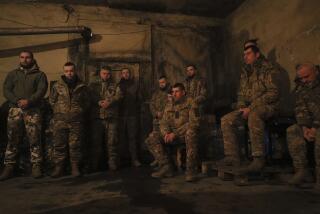We Do What We Have to Do--Alone
- Share via
“Isn’t it great to be a superpower?” I said to my wife and children as we sat in the secure comfort of our house listening to the popcorn sound of explosions in Tripoli coming through the television from a fortuitously placed NBC telephone.
“From the halls of Montezuma to the shores of Tripoli.”
“Where is it?” asked one of my future freedom fighters just as, on cue, a map appeared illustrating, to a population largely ignorant of geography, not only the location of the country but also the precise target of the American bombers.
My remark was not intended as irony. In matters of violence even the most miserly would agree that it is better to give than to receive. And the security of my home had been hardly won--in two World Wars, Korea and the dedication of vast resources to the construction of military strengths that only one nation (not Libya) could even dare to challenge. One’s instinctive distaste at seeing this power used was instantly dispelled by awareness that it was the only weapon that we had--not to enforce our will, but to resist the hostile will of others.
Libya had proclaimed its intention to blow up Americans around the world. It had then begun to do so. It was, in the confused modern style, a declaration of war that we answered with explosives of our own.
Terrorists cannot be opposed by fruitless attempts to uncover and punish those who carry out the attack. They are not outlaw gangs for individual criminals, but front-line soldiers in the most modern form of warfare. They can be halted only by striking against those who sustain and command them.
Unfortunately, military retaliation is a blunt instrument against so subtle and fragmented a form of warfare. It doesn’t significantly reduce the enemy power to strike. It doesn’t deprive him of weapons, support or bases. It may reduce his will, but even that is little more than hopeful conjecture. Nor is it the best form of defense.
Diplomatic and economic sanctions by all the Western nations would be far more likely to arrest terrorism and disable its sponsors. That course, however, was tried. And it failed. The leaders of nations like France and West Germany echoed the blasts of bombs in their own capitals with feeble, almost whining, disavowals of any form of common action against a common threat.
And that is the great lesson of Libya. It illuminates the almost total disintegration of the international institutions and alliances established after World War II to keep the peace and defend the West. Every discussion of Libya has been laced with reference to the opinions of our “allies” and “friends.” The truth is that we no longer have allies--except against the Soviets. And we have no friends--not if friendship means, as it must mean, willingness to share in the responsibilities as well as the fruits of power.
Over the last three decades the European nations have been drained of the will, the energy and the sense of common purpose needed to sustain an alliance. This is not due solely to mistakes of judgment, incompetent leaders or flawed policies. Their time has passed. History has left them behind. The once-great civilization that dominated the human adventure for centuries no longer exists. In its place there is a handful of enfeebled nations, struggling to make a buck, devoid of great aspirations, satisfied to survive and dependent for that survival on the nuclear power of the much-maligned United States.
History has a parallel. Thousands of years ago the great cities of ancient Greece tore each other in legendary conflicts. When the years of war ended, they had lost their world preeminence to two rising superpowers: Macedonia and Persia. Unwilling to join in common resistance, they declined. Forever.
In our own century, during two World Wars, Europe repeated the blundering savagery of its illustrious ancestors, leaving--as poet Robinson Jeffers predicted--”two bulls in one pasture.”
The Western “alliance” now means only one thing: European reliance on the United States for defense against Soviet expansion. In return for this protection we are allowed to use European bases as part of our defensive shield and receive some token military assistance from a handful of nations. Beyond that, almost nothing.
The United States has had virtually no help from any of its “allies” in any substantial enterprise in the last 20 years. Some of this failure may be due to honest disagreement. But this is not that sort of failure. Nor is it lack of strength. Modern Europe, if there were such an entity, could play a large and honorable part in the course of world events. But the will is gone. That mysterious process of erosion and decay that comes to all civilizations has now overwhelmed Europe.
The end of “alliance” has very large consequences. In the case of Libya it means that we cannot look to the common action that would be the surest defense. We can only do what we can do alone. And that’s what we are doing.
More to Read
Sign up for Essential California
The most important California stories and recommendations in your inbox every morning.
You may occasionally receive promotional content from the Los Angeles Times.












